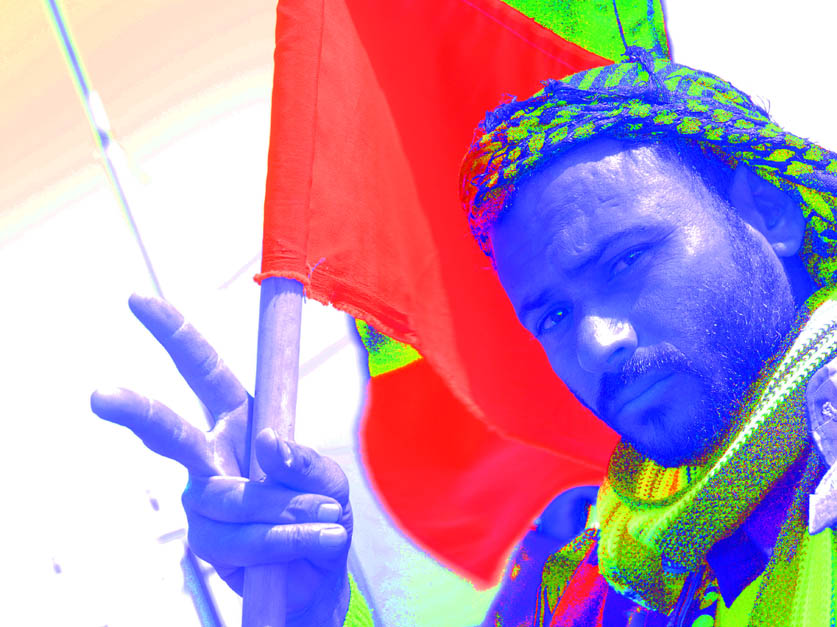
Remember when Libya was an almost hopeful place that was a brief free-for-all for journalists? How naive does that seem today in 2016. Imagine trying to drive from Benghazi to Ras Lanuf now… ©2011 Derek henry Flood
New York- One of my first notions of this still new year is that the heyday of the ‘Arab Spring’ was firmly five years ago. The uprisings and revolutions of 2011 were either usurped, crushed, or soundly defeated, It is oft said that Tunisia is the Arab Spring’s singular success story due to its firm state structures (and perhaps proximity to the southern shores of the EU). But keep in mind that Tunisia produces the most mujahireen (emigrant jihadi fighters) per capita. The wunderkinds of the Benghazi media centre are now considered ‘veteran’ journalists, the ones that are still in the game anyhow. Libya is mostly a no go zone for journos like myself and an IS tentacle controls Qadaffi’s last bastion of Sirte. 2011 transformed France from the 2003 “freedom fries” Chirac era to one of the most proactive Western state actors in military interventionism today. Times have changed and not necessarily for the better.
2016 is looking rather bleak in terms of global counter radicalisation efforts and containing war fighting in the second, third and fourth world realms. Further discord has been seeping into Central and West Africa for years now and North Africa is still reeling from this chaos. Calling Iraq and properly functioning state today is absurd. The rump state headquartered in Baghdad will be lucky to maintain the territory is currently administers intact.
Despite analysts stating that IS gains are receding and the group is lashing out in the West as some form of asymmetrical offensive measure signaling that its territorial position is weakening, the so-called Kurdish question not only has not abated but has been greatly exacerbated. Though IS has greatly threatened the Kurds obviously, leaders from Suleimaniyyah to Afrin have used the conflict to firm their grip on land. The arc of Kurdish control south of Turkey and west of Iran has expanded and deepened. Meanwhile The conflict within Turkey itself has reignited and worsened. IS is now operational as far north and west as Istanbul within the Turkish republic and Ankara not only has no feasible strategy to defeat it but its obsession with Kurdish ethno-nationalism enables such expansion.
The West’s strategy to defeat IS is made up mostly of air strikes and press briefings. There is no cohesive strategy amongst the P3 (US, UK, France) and this is to the salafi-jihadis advantage. Russian scorched earth style warfare will accomplish nothing other than to smash cinder blocks and the vulnerable human beings trapped underneath them. Russia’s policies in the North Caucasus have been an abject failure. Anyone who knows the bleak history of the Russo-Chechen wars can’t be hopeful about Moscow’s efforts in a hyper fractious Syria.
Chinese naval encroachment in the South and East China Seas is not going away. The Philippine authorities are busy asking the united States Navy to return in a robust partnership to curb the People’s Liberation Army Navy in the Spratlys. The Chinese Navy and/or Coast Guard is also making incursions into the disputed Senkaku/Diaoyu islets which a theoretically pacifist Tokyo cannot stand. As all eyes remain on the fire and drama of a misunderstood Middle East, East Asia has a depth of inherent geopolitical conflict that is being largely overlooked by the rest of the global public.
Then there is Ukraine. From the Maidan to rebellion enmeshed with covert action to unabashed war, the fight in the Donbas continues on. Despite talks between leaders at the executive level, the Minsk Agreement seems worthless. Though the embattled President Poroshenko vows to restore sovereignty over the Donetsk and Luhansk “republics,” just how he would accomplish this seems far from clear to me. Some are predicting the war in Ukraine may come to some sort of conclusion in 2016 but the best case scenario is more likely to be its devolution from a hot conflict to a frozen one.
When one looks at the Moscow-supported fracturing of the Georgian state which has gone on for years now, Ukraine looks bleak if peered in through the Georgian prism. Of course the war for the Donbas is vastly different–no two conflicts are truly analogous–Russian intransigence is part of state policy since the end of the Yeltsin period. Donetsk and Luhansk are not Abkhazia and South Ossetia but there are some rough similarities even in the semantics of the areas being referred to as “rebel republics.”Sure, the Putin regime attends negotiations, but what do they really accomplish? In the Caucasus as a whole, all they have done is establish a status quo with a bureaucratic creep backed up by the FSB’s own internal agendas.
And people wonder why I look at cheerful imagery of the beaches of Oceania as a fleeting escape…